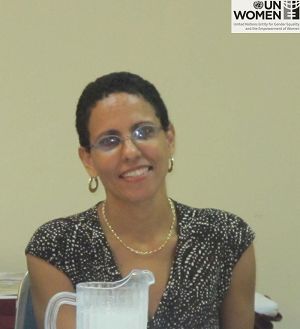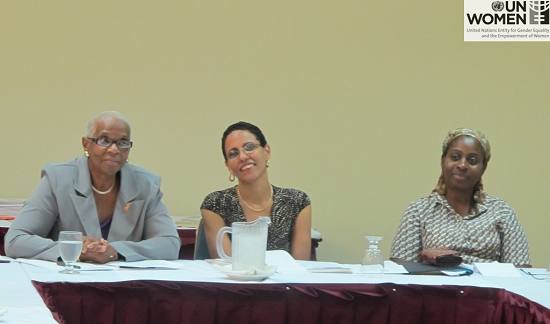UN WOMEN - CCWA National Consultation
l=x.length;for(i=0;iDate:
Remarks delivered by the UN WOMEN Regional Programme Director Roberta Clarke at the National Consultation on “Advancing Women’s Leadership and Advocacy for HIV Action”
in Grenada on 6 May 2011.

For we know from women and men who have been working on the frontlines of HIV prevention, treatment and care that HIV is both a cause and a consequence of stigma and discrimination and that this is complicated by poverty which undermines capacities to self-protect. Stigma and discrimination interferes with the personal power and leadership needed to demand quality health and social care as well as community respect; to demand in other words the fullest enjoyment of human rights.
Over the last three days in Grenada, UN WOMEN as the secretariat for the Caribbean Coalition on Women and AIDS led a leadership development training workshop for women engaged in HIV actions and advocacy. The participants drawn from five countries: - Antigua, Saint Lucia, Trinidad and Tobago, Jamaica and Grenada - quickly bonded around shared aspirations for greater social justice for all in the Caribbean.
UN WOMEN has been very keen to partner with UNAIDS and with regional rights and HIV NGOs in the workings of this network that is CCWA. It is a network of advocacy and action and advances the idea that we all have both personal and collective responsibility to ourselves and others to prevent harm and to protect the vulnerable.

The change we need comes first at the level of culture. How do we build societies where we hold firmly to the idea that all individuals are entitled to enjoy the range of human rights, to be treated equally, to be able to speak freely, to feel secure in both private and public spaces, to have access to quality health, fulfilling education, decent work; where not only do we hold firmly to these principles but that our actions and those of the state consistently take us all in that direction.
We know from studies and from dialogues with those most affected by HIV that we are still some ways from having that culture of empathy, consideration, care and insight. For make no doubt, stigma is an expression of ignorance and yes, hard-heartedness.
People living with HIV, women living with HIV tell the tales of hostile and indifferent treatment by health workers who may refuse to touch them, who may insult them, who leave their medication outside on the ground because they do not want contact.
We are told of the breaches of confidentiality which people living with HIV experience by workers in health care institutions who lack discretion and are indifferent to those already in painful and emotionally fragile states due to stigma and discrimination.
We are told of prospective employers who demand to know the HIV status of applicants. We are told of women who are dismissed from their jobs because of improperly attained knowledge of positive status.
The CCWA is at its heart an advocacy network. It is intended to provide a space through which we can ensure that the perspectives on gender equality and women’s empowerment can be given voice; through which women affected by HIV (and that is all of us) can have influence on policy makers and programmes to ensure proportional impact of the great quantities of money being targeted at HIV in the Caribbean. The money, and it is a lot, has to work in the interest of child protection, gender equality, ending violence against women, building social safety nets for low income single women households; ending stigma and discrimination, as it does to ensure universal access to care and treatment.
CCWA then is an advocate and a monitor. The women associated with CCWA are called upon to courageously speak out, everywhere, in all the spaces where they are influential- whether it be the Parliament, the workplace, the school, the church, the dancehall, the media and of course the home. It is a Coalition of Women and Girls but it is a Coalition that appreciates that unless men make the personal changes and support the needed actions in the public space, cultural transformations will take longer than the time that we have to truly stem the HIV and violence epidemics.
What is specific about the CCWA is that we are asserting that reduction in vulnerabilities and HIV cannot be accomplished unless we understand gender inequality and harmful gender stereotypes about masculinity and femininity as core drivers of the HIV pandemic. Through the CCWA, we aim to accelerate gender-responsive prevention messaging to both the public as well as those responsible for policy making and HIV.
The work of UN WOMEN and the CCWA is premised on the imperative of building, encouraging our individual and collective instincts and skills for transformational leadership. What we do, all of us, matters to the whole. By transformational leadership we mean a way of living within and with others that is reflective, self-aware, responsible, caring and intentional for building social and gender justice and peace.
The aim is that through this dialogue we will get a better understanding of the remaining actions and policies that have to be adopted to ensure that our prevention, treatment and care respond to the realities of those most affected by HIV.
UN WOMEN has worked in Grenada on gender, human rights and HIV and we welcome the opportunity to continue this work.
I wish to thank in closing Senator the Honorable Ann Peters Minister of Health, for her energy, for her empathy and for her continued commitment to building a Caribbean which cares for all.
For further information, please contact Sharon Carter-Burke, Communications Specialist - UN WOMEN at E-mail:or Tel. 246-467-6000 Ext 6124.